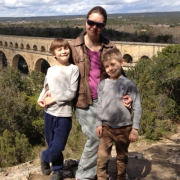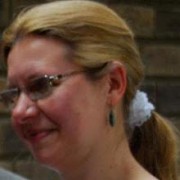Writing Blind, a Creative Force

Dr Hannah Thompson and her sons
I have been partially blind since birth but it is only since I started writing blog posts that I have understood the extent to which my blindness influences the way I write. When I was a postgraduate student a careless comment by a professor about my powerful reading glasses made me realise that my partial blindness dictates not only how I read but also, more significantly, the thoughts I have about my reading matter. When I read print, the amount of magnification I need means that I cannot skim read. I read word by word and so I have always tended to focus on a text’s details rather than its bigger picture. At first this revelation upset me: I had spent years trying to downplay my blindness, trying to function as a sighted person, and so it was both infuriating and disheartening to find out that others were quick to make what I saw as a reductive association between my sight and my work.
Now that I am learning to see blindness in a positive way, and to applaud the different perspective it gives me, I am able to celebrate my particular way of relating to the texts I read. Since I started using Braille (which I taught myself last year), every word is a sensual interaction which I feel with my fingers but which resonates through my whole body. When I recall novels I struggle to remember major plot twists but I always know how the characters and their actions were described. It is perhaps not surprising then that my focus as an academic (working mainly on nineteenth-century French literature) has always been on close textual analysis. In my books, articles and blog posts devoted to the discussion and analysis of texts, I tend to concentrate on an image, a metaphor or a turn of phrase which has caught my attention. I then use these apparantly incidental or seemingly insignificant details to develop an argument about the text more broadly.
It has only occurred to me much more recently that my way of writing is as strongly defined by my blindness as my way of reading always has been. And, most importantly, that this is no bad thing. Clearly the way I read influences the content of what I write. I am best at detailed analysis and love looking closely at a text’s minute details and teasing out meanings from them for my readers. But what is perhaps more surprising is that the way I write, both my process and my style, are just as related to my blindness.
I learnt to touch type when I was eleven and this is undoubtedly the single most important thing the Visually Impaired Unit at my local comprehensive school taught me. I can type in the dark, with my eyes closed or with the cat sitting between me and my computer screen. I tend to type out my thoughts as I have them in a rather random way. Despite the advice I always give my students, I rarely make plans and much prefer to move my words around on the page once they’ve made it there in the first place. The cutting and pasting functions of modern technology are fundamental to the way I write. So after typing comes rearranging, honing, re-reading and a process of editing which can seem endless. This part of the process is much more visual than the initial typing: I am both reader and writer of my text and therefore tend to do what I do best: I focus on the detail.
When I look at my work on screen I can see at best three or four words at a time. This is why I favour short sentences. I need to write in a way which I can follow. Long convoluted sentences, cleverly complicated arguments and beautifully-crafted paragraphs are all very well, but they tend to confuse me. I need my writing to be simple, straightforward and to the point. Otherwise I will get lost in the detail and never find my way out. It is rare for an academic to favour simplicity of style. I used to worry that fellow academics would think my work too basic or banal because of its straightforward expression. In fact I do deal with complex ideas and theories, but I break them down into manageable chunks, not for the brain, but for the eyes.
As I become more confident as a writer, (especially as a writer of blog posts whose shortness seems to suit my telegrammatic style) I realise that I am happy that the way I write is defined by my blindness. This helps to remind me, and, I hope, others, that blindness does not have to be a tragedy, a burden or a curse. When its power is embraced, it can become a different way of being in the world, a creative force, and personal and political stance.
—
Dr Hannah Thompson is a Senior Lecturer in French at Royal Holloway, University of London. Her second book, Taboo: Corporeal Secrets in Nineteenth-Century France was published by Legenda (Oxford) in June this year. She is also the author of the acclaimed ‘Blind Spot’ blog.
Visit her blog hannah-thompson.blogspot.co.uk or follow her on twitter @blindspothannah
Category: Being a Writer, Contemporary Women Writers, On Writing


























Dr.Hannah you’re just an inspiration even to those who has perfect sight,, bcoz sometimes we ignore things before getting its detail shame on us.
But you always do everything with detail so as excellent work will be sure output..
In the 80s I was a certified Braille transcriber — A book maker! It was back in the time where we were just on the edge of computerizing everything but not quite there yet. I had a group of volunteer transcribers who, page by page, transcribed text by hand using Perkins braillewriters. I’m sure this is where my proofreading skills came from–each page had to be perfect.
There was a quote that I always liked, despite its sappiness. It is attributed to Jim Fiebig (not sure who he was). “There is a wonder in reading Braille that the sighted will never know: to touch words and have them touch you back.”
When I started meeting people in the Deaf-Blind community, this had even more meaning to me.
Thank you for sharing this post and your experiences writing with partial blindness. It has given me something to think about and a different perspective on the writing process. What I found most interesting is that when I considered your perspective I concluded that indeed as a sighted person, I can at times be blind to important detail. I will now pay closer attention. I am also a little jealous that you can still work with your cat sitting between you and the computer screen.
I have been partially blind since birth but it is only since I started writing blog posts that I have understood the extent to which my blindness influences the way I write. When I was a postgraduate student a careless comment by a professor about my powerful reading glasses made me realise that my partial blindness dictates not only how I read but also, more significantly, the thoughts I have about my reading matter. When I read print, the amount of magnification I need means that I cannot skim read. I read word by word and so I have always tended to focus on a text’s details rather than its bigger picture. At first this revelation upset me: I had spent years trying to downplay my blindness, trying to function as a sighted person, and so it was both infuriating and disheartening to find out that others were quick to make what I saw as a reductive association between my sight and my work.
Hannah, you articulate an approach to reading and writing that resonates with me. As a fellow blind blogger and as a teacher of writing, I find each day’s literary activities shaped by my own blind perspective.
You mentioned that, because of your vision, you favor short sentences. This reminds me of my own endeavors in writing braille poetry. Because the braille line is so much shorter than the print line, only holding about 40 characters, the poet who writes in braille must creatively manipulate line breaks. But as you know, in braille, one word can be represented by a single character, and this lends a different poetic effect to the words produced.
I rely heavily on text-to-speech software for editing my own work. While this technology seems a natural recourse for blind people, it is by no means a “blindness only” technology. As I encourage my students to read their own work aloud, I often find myself telling them how to activate the text-to-speech functions on their own computers. A text-to-speech program is much less forgiving than the self-correcting effort of the writer who reads her own work aloud! In this case, the perspective offered by my blindness – the tools I MUST use – suggests an unexpected and helpful measure to my sighted students.